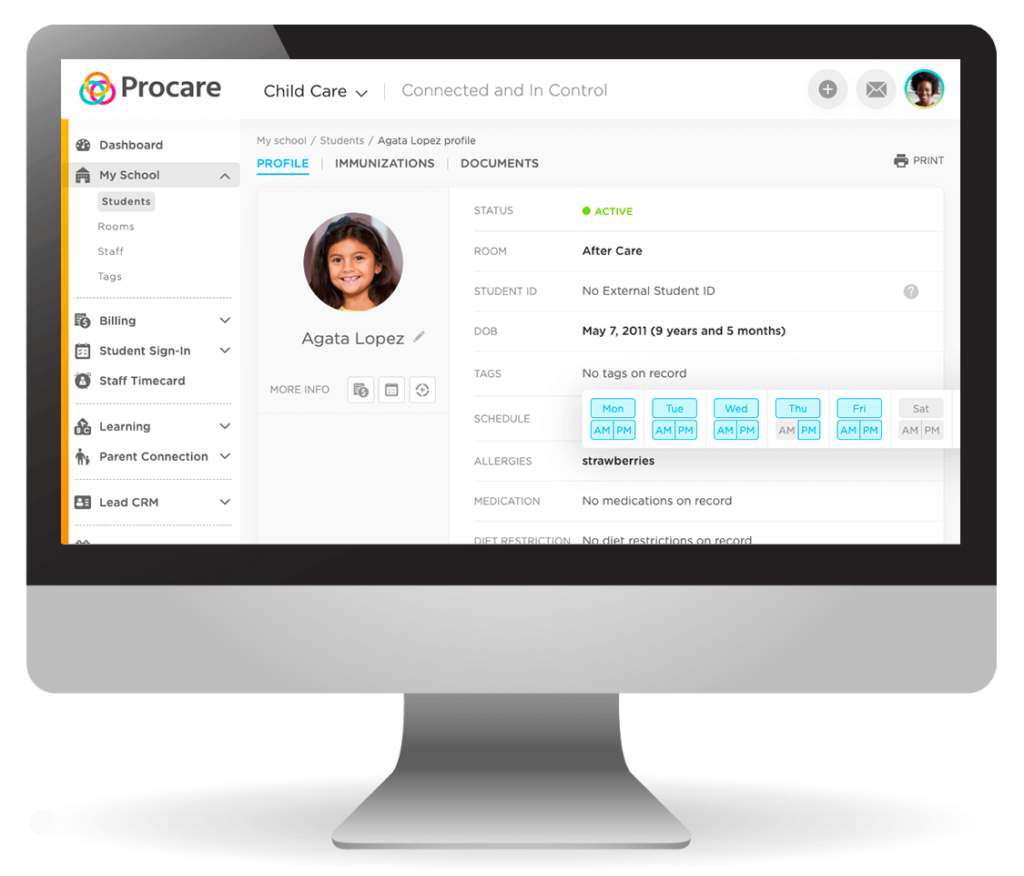
Child care is a rich and diverse field with many different employment options. As a result, it can be both difficult and exciting to choose where to go next in your career.
If you’re passionate about working with kids, you might be thinking about starting up a brand new child care program. Starting your own child care operation is both challenging and rewarding, and there are several different types of child care programs you can set up to start putting your skills and passion to work.
In this post, we’re taking a look at seven types of child care businesses that you can start in your community. We’ll provide an overview of each type of program, along with the key advantages it offers and the biggest challenges you’ll need to anticipate when getting started.
7 Types of Child Care Programs You Can Start
Child Care Centers
Overview: A child care center is a facility dedicated to the care and education of children, especially during the day while parents are at work. With a full complement of staff who are usually qualified in early childhood education, a child care center provides a nurturing environment for medium to large-sized groups of kids.
Key Advantages: Opening a child care center enables you to build a team that can meet the needs of every child in your care, from age-based classrooms to disability support. For ambitious child care entrepreneurs, child care center management is an opportunity to implement an educational program that fits your vision for excellence, with lessons and activities that draw on your own knowledge and experiences.
Biggest Challenges: Center-based care facilities are the most complex type of child care operation. In addition to more stringent licensing requirements, child care centers come with more administrative and managerial overhead than other types of child care businesses. Child care center management software can help you manage all the needs of a larger, licensed child care business, like monitoring staffing ratios, billing and invoicing, attendance tracking and dropoff/pickup management.
Home-Based Child Care

Overview: A family child care home is a type of daycare within the care provider’s home, often including their own children. Family child care homes may or may not require licensing depending on your region and the number of children in the home. They usually have lower capacity and fewer staff than child care centers.
Key Advantages: The best part about starting a family child care home is that you won’t need to lease a commercial location to set up your center. As a result, you’ll save on many of the up-front and month-to-month costs normally associated with opening a child care business – especially commercial rent. This benefit can be passed on to parents in the form of lower child care tuition fees. Family child care homes have lower maximum enrollment than center-based care facilities, so you’ll have more opportunities to develop close bonds with the children in your care and their families.
Biggest Challenges: Running a solo business, as family child care home owners often do, is demanding. You’ll need to take care of a variety of different operating concerns on your own, from bookkeeping to student attendance tracking and security. But you don’t have to start from scratch — an all-in-one child care management solution can help, with no accounting experience required.
Child Enrichment Programs
Overview: Child enrichment programs offer tutoring to kids who need a higher level of education than in a public school classroom, or whose parents want them to get a head start on their education. Ages can range from preschool to middle school and beyond, and they can cover basic academics, sports, the arts or more specialized subjects as children get older.
Key Advantages:
- If you have knowledge of a specialized subject, this type of child care program will let you put your skills to work.
- You’ll help kids develop their interests and abilities, and boost their performance in school.
- This type of child care program is a good fit for those who want to work with older kids.
Biggest Challenges: Child enrichment programs frequently command higher enrollment fees than center-based care. As a result, parents of kids in your program will have high expectations for developmental and educational progress. To satisfy them, you’ll need to provide high-quality lesson planning and activities, and consistently deliver on your promise of accelerating child development in your community.
Before and After School Programs

Overview: Before and after school programs are activity-based programs that may be hosted at a local public school or another location in the community. They provide care and developmental opportunities to kids and teens before and after school while parents are working. They involve fun and educational activities, from music and dance to sports and even kids’ coding classes.
Key Advantages:
- If your program is run out of a school building or existing daycare facility, you can save on operating costs.
- There is a large amount of flexibility in these programs, so you can have fun teaching kids something you love.
- In some areas, this type of child care program is eligible for subsidies or other government funding.
- In addition to supervising younger children while parents are at work, this type of child care program plays an important role in the community by offering prosocial activities for at-risk teens.
Biggest Challenges: If school space is unavailable, it may be difficult to find a location that is convenient for kids to travel to before and after school. Many after school programs have turned this challenge into a competitive advantage by offering a pick-up/drop-off service for kids who attend local schools. This simple solution also assures parents that their kids are safely chaperoned to and from your program each day.
School Age Programs
Overview: A school age program is a type of center-based or home-based child care that provides care for school age kids, typically between five and 12, while parents are working. School age programs generally operate before and after school during the school year, and all day during the summer and holidays.
Key Advantages: With the increase in households where both parents work or there is only one parent or guardian, more and more parents need someone to make sure their kids are safe when they are not in school. It won’t be hard to find business, as these programs often have waiting lists to get in.
Biggest Challenges: It can be challenging to plan activities for diverse age groups with varying interests. You’ll need to wisely schedule, coordinate and track activities, and you may want to monitor children’s skill progress to help them advance. Procare’s activity management features can help you plan, manage and track activities to ensure that every child’s needs are met.
Preschool Care Programs

Overview: Preschool care programs specialize in educating young children between three and five years of age. They prepare children to enter school and form the building blocks of socialization, and may run for only part of the day.
Key Advantages: Preschool care programs are a great option for stay-at-home or work-at-home parents who need a break for part of the day, and for parents who want to make sure their kids enter school with strong social and emotional skills. For child care providers, they are perfect for those who love educating young kids.
Biggest Challenges: Parents often have concerns and may even experience anxiety as they enroll their children in preschool care for the first time. Parents worry about whether their children will make friends, participate in stimulating activities, get enough one-on-one attention, and learn what they need to be successful in kindergarten. Effective parent engagement is essential to reducing parent anxiety and keeping parents reassured about their kids’ safety and developmental progress.
In-Home Child Care
Overview: In-home child care covers a number of jobs such as babysitter, au pair or nanny, but what they have in common is caring for a child or children within their own home. In-home child care positions may be full-time, live-in, regular or casual.
Key Advantages:
- Providing in-home child care offers you the freedom to set your own hours and choose what kind of work you want to do.
- You’ll have the opportunity to give plenty of individualized attention to each child and maximize your impact in their lives.
- In-home child care lets you form very close relationships with your charges, in some cases becoming almost part of the family yourself.
Biggest Challenges: In today’s gig economy, getting steady work can be difficult. You can set yourself apart from other in-home child care workers by obtaining more qualifications. Your services will be especially valued if you can provide help with homework or tutoring in a second language.
Launch Your Child Care Business with Procare Solutions

With more than 30 years in the business of child care, Procare is your competitive advantage when it comes to launching a successful program in your community.
Procare’s child care management app and related technologies support child care operations of all sizes with powerful features like attendance tracking, automated child care billing, and a robust parent engagement platform. You’ll be able to streamline critical management tasks, impress your customers with convenient billing, and stay connected and in control of your child care business.
If you’re ready to get your child care business off the ground, request a demo today to see how Procare can help.



